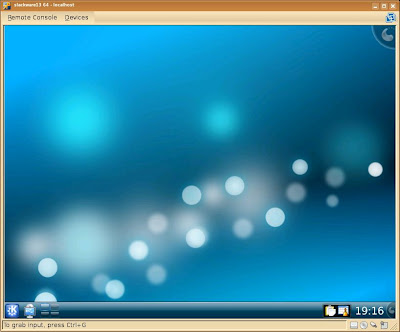Booth versions will be installed as virtual machines on vmware server over kubuntu 8.04 64 bits (I had some freeze troubles with booth versions of slackware and I don't know if they are related to the fact that they were running on vmware).
Machine specs
- Intel Q6600 quad core processor overclocked at 3.0 Ghz
- 4 Gb of RAM
- intel dg35ec motherboard
- Kubuntu 8.04 64 bits
- VMware-server-2.0.0-116503.x86_64
- WD 250Gb SATA hard disk
- 1gb of ram
- 2 processors asigned
- 8 Gb hard disk pre allocated optimized for performance (not security)
- slackware-current-30_Jun_2009-DVD.iso (1,747MB) ftp://ftp.slackware.no/linux/slackware/slackware-current-iso/slackware-current-30_Jun_2009-DVD.iso
- slackware64-current-30_Jun_2009-DVD.iso (1,682MB) ftp://ftp.slackware.no/linux/slackware/slackware-current-iso/slackware64-current-30_Jun_2009-DVD.iso
- Wellcome screen: press enter
- select your keyboard: press 1 to select keyboard, hit enter to use the US keyboard (I selected the spanish layout)
- login as root: write root and press enter
- partition your hard disk: write cfdisk at the console, hit enter and make the partitions on your harddisk, for this test the hard disk will be partitioned 8250 mb single partition for / filesystem and a 337 mb for a swap partition
- begin the installation process: write setup on the console to run the good old slackware installer
- select the swap space option: the swap partition you have created should appear, press ok, the installer it's going to ask you to check for bad blocks, I choosed no, the installer it's going to show you a resume screen, press enter
- select linux partitions, in my case there is only a root partition, press enter, the installer it's going to ask you for the format mode, I selected quick format
- Select filesystem for your hardisk..... mmmm...... let's try ext4 :), the installer shows you a resume screen
- select the slackware 13 installation source, in my case a slackware cd or dvd, option 1 and press enter, select auto for the scan of the medium
- In my case I would make a full install of slackware, I select everything and press enter, in the prompt mode for packages installation I selected full
- and... and... ... it's freezed (for x86_64) version, try again with reiser fs and freeze, again with huge.s kernel and ext2 and it worked...
test for 32 bits version will be with the huge.s kernel and the ext2 filesystem... and... and... it's freezed, well, let's try with ext4... freezed... reiserfs... freezed, hugesmp.s and ext4... and it worked...
- make usb flash boot, selected skip
- install lilo, selected simple
- frame buffer, selected 800x600, 256 colors
- extra kernel parameters: pressed enter
- selected no for utf-8 console
- lilo destination: mbr
- mouse configuration: imps2
- gpm configuration, selected yes
- configure your network: yes; hostname: slack; domainname com; ip address setup, selected dhcp; dhcp hostname: pressed enter; confirm setup: yes
- startup services: press enter and select the defaults (netatalk, fuse, hald, innetd, messagebus, pcmcia, syslog, sshd)
- try custom fonts: no
- hardware clock set to utc, no, selected my country
- desktop manager: kde
- select password for root: no (you should do it, and don't forget it)
- selected exit to reboot
- write reboot on the console and press enter
- installation time (only packages from the moment it install the first A section package to the make usb flash boot screen): 64 -> 20.5 min; 32 -> 27.55 min
- first boot time (from lilo to login): 64 -> 38 secs; 32 -> 43 secs
- second boot time (the first time it do some process that it only does the first time): 64 -> 30 secs; 32 -> 33 secs
- first startx time (from enter to akonadi report): 64 -> 30 secs; 32 -> 64 secs
- startx after logout from first startx (from enter to akonadi report): 64 -> 20 secs; 32 -> 20 secs
Default desktop
The default desktop is KDE version 4, kudos to kde team.

Curiosities:
- The welcome screen of the installer iso for the 64 bits version of slackware says version 12.34567890 instead of 13 rc1 (although I found the numbers of 1 to 0 a nice detail :P), also it says that the machine has to be at least pentium pro :P
